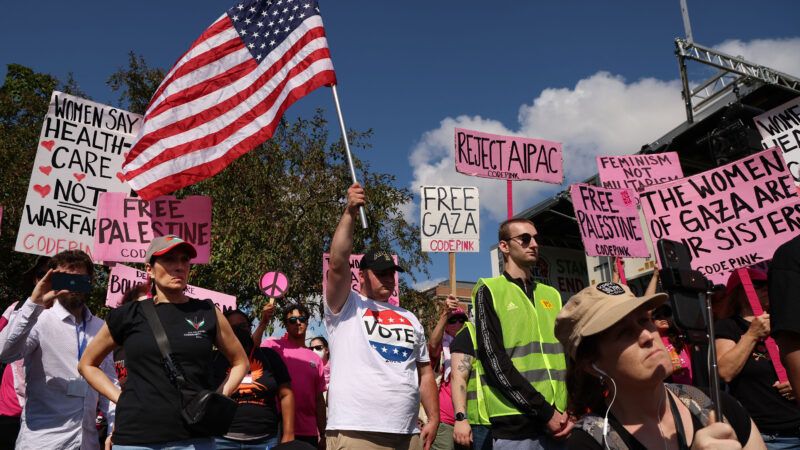Muted Outrage and Aspirational Crowds: Dispatch From the DNC
Early protests at the 2024 Democratic National Convention reveal uncertain momentum.

Depending on how you feel about protesters, there's good news or bad news about the estimated number expected to converge on Chicago this week for the 2024 Democratic National Convention: 30,000. Either way, you would not be faulted for thinking the number is possibly aspirational, based on the fewer than 50 who showed up yesterday for an outdoor event and press conference organized by the Coalition to March on the Democratic National Convention.

"Almost 270 organizations from across the U.S. have joined the Coalition to March on the DNC. And tens of thousands will be out on the streets starting tomorrow," Hatem Abudayyeh, coalition spokesperson and U.S. Palestinian Community Network national chair, told the assembled, who politely took notes and asked him to repeat the marching schedule. They nodded in commiseration at the city's "approved march route," a 1.1-mile stretch that threatened to become a human parking lot and did not take marchers past the United Center, where the DNC is taking place.
"Which means that the thousands do not get their First Amendment rights upheld," he said. "They do not get to be within sight and sound [of United Center] to say, end Israeli occupation, end U.S. aid for Israel, end U.S. support of the genocide."
Abudayyeh vowed to keep pressure on the city until the very last minute, hoping that after months of legal wrangling, it would allow the 2.4-mile route they had originally hoped for. It sounded rather self-limiting and not perhaps in the spirit of the protests that have roiled the country since October 7, a refashioning perhaps of rage into something potentially more politically expedient.

There was no rage at yesterday's event, no black hoodies or keffiyeh-shrouded faces, no shouting or snapping when Faayani Aboma Mijana, a spokesperson for the coalition, cited the "horrific genocide of Palestinians that's being aided and abetted by the Democratic leadership and its representatives, Genocide Joe Biden, Killer Kamala Harris, Baby Killer Blinken." Even when Mijana enjoined the crowd to chant "From the river to the sea, Palestine will be free," the response was muted.
Maybe it was activism fatigue. Maybe the long run-up to the convention—the march had been in the planning stages since before October 7—had sapped some spontaneity. Maybe the multifariousness of those looking to coalesce under the coalition's umbrella—Abudayyeh mentioned "the Black Liberation Movement and the Immigrant Rights Movement and the Women's Rights Movement and the LGBTQ Movement and the Workers' Rights Movement and the Reproductive Rights Movement"—rendered the movement more PTA, less punk rock.

Not that the event was without anger. Mijana, an organizer also for the Chicago Alliance Against Racist and Political Repression, was especially critical of the Chicago Police Department, claiming that "the same Israeli occupation forces that are committing the genocide in Gaza, train police departments like the Chicago Police Department, who then implement the offensive tactics they learn onto our communities."
Still, no one anticipated any violence and certainly would not be participating in it. "We intend to have a family-friendly, peaceful march," Mijana told me. "That's why we're fighting for the permits, because we know that will keep the police away from us and allow us to march on our own with our own people."
But any movement of size creates a collective effervescence that can spill over and attract people outside the cause, including bad actors and those seeking a perverse type of heroism. This was evident when James Alex Fields Jr. drove his car into a group of counter-protesters during a 2017 "Unite the Right" protest in Charlottesville, killing Heather Heyer, and when Michael Reinoehl, in an effort to prove his commitment to Black Lives Matter, shot Jay Danielson point blank during a 2020 protest in Portland.
This suggests DNC protesters might welcome some police protection, if only for themselves.
"I'm from Minneapolis, so I know a little something about some mayhem," said Jess Sundin, of the Twin Cities Coalition for Justice. "Every time I've seen that on any significant scale, it's been police attacking demonstrators, is what starts it. I am not trying to be dismissive, but my experience is that if the police refrain from using violence against the demonstration, we won't see any sort of significant no mayhem, no significant outbreaks of drama."
Perhaps. And if Sunday's event was a foretaste, the protests will be disciplined, even mild. But I wouldn't count on it.


Show Comments (58)